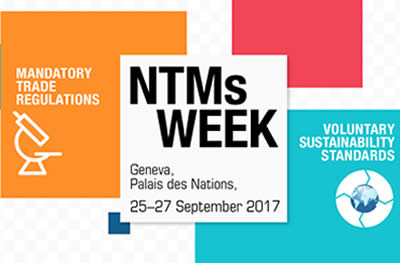NTMs Week, to be held in Geneva from 25-27 September, sheds light on the importance of mandatory trade-related regulations and Voluntary sustainability standards on international trade and development, and shows successful global, regional and national approaches to tackle the challenges including transparency initiatives and regulatory cooperation.
Regulations and standards are at the center of Global Trade. Some 96% of world trade is affected by at least one regulation, often referred to as a "non-tariff measure".
Business surveys as well as quantitative assessments show that with falling tariffs, NTMs have become the more important impediment to trade. Challenges are not only costs of compliance but also the lack of transparency. Meeting these complex and often opaque rules requires financial and technical resources, which means that the smallest and most vulnerable companies and countries pay the heftiest price.
This is especially true for exporters from the 48 least developed countries, who lose an estimated $23 billion a year - that's 15% of their exports, which far exceeds the loss incurred by remaining tariffs - because they are unable to find information on and comply with non-tariff measures.

However, NTMs cannot simply be eliminated because they serve to ensure food safety, protect health of humans, animals and plants, fight pests and diseases, and protect the environment. The key to solution lies on increasing transparency of NTMs.
"The real untapped potential for further trade growth lies in regulations", said UNCTAD Secretary General, Mukhisa Kituyi, adding, "More transparency on Non-tariff measures and regulatory standards approaches can improve regional trade and regional integration especially for small companies in developing countries".
UNCTAD NTMs week scheduled from 25-27 September in Geneva will gather policymakers, trade negotiators, and senior trade and development experts to improve our understanding on this issue.
The NTMs week opens with policy debates and research findings on the first day. The meetings shed light on the importance of NTMs on international trade and development, and show successful global and regional approaches to tackle the challenges including transparency initiatives and regulatory cooperation. Moreover, the meetings will share findings from recent research on NTMs.
On the second day of the NTMs week, the Multi-Agency Support Team (MAST), policy makers and experts discuss the revision of the International Classification of NTMs. Expert groups have been working on specific areas to revise the taxonomy on rules of origins, government procurement, subsidies, intellectual property and post-sales services. The International Classification of NTMs has evolved into a common language for the international trade community. This expert meeting follows previous expert meetings in September 2015 and October 2016.
Discussions on the third day will focus on voluntary sustainability standards (VSS), often referred to as "eco-labels". In addition to well-known VSS such as Fairtrade International, Marine Stewardship Council, Rainforest Alliance, and UTZ, there are over 450 VSS that apply to major exports of developing countries in the agricultural, fishery and forestry sectors, such as coffee, tea, bananas, cocoa, palm oil, coconut oil, timber, and cotton. Drawing upon findings from works conducted by UNCTAD and partner organisation, the workshop will discuss VSS' potential impact upon developing countries' inclusive trade growth and sustainable development.
UNCTAD coordinates the global effort to collect and freely disseminates comprehensive data on currently imposed non-tariff measures. The Global Database on NTMs of UNCTAD and its partners (TRAINS accessible at i-tip.unctad.org) cover over 80% of world trade and further data collection is underway, particularly in Africa. These efforts go hand-in-hand with capacity building.



